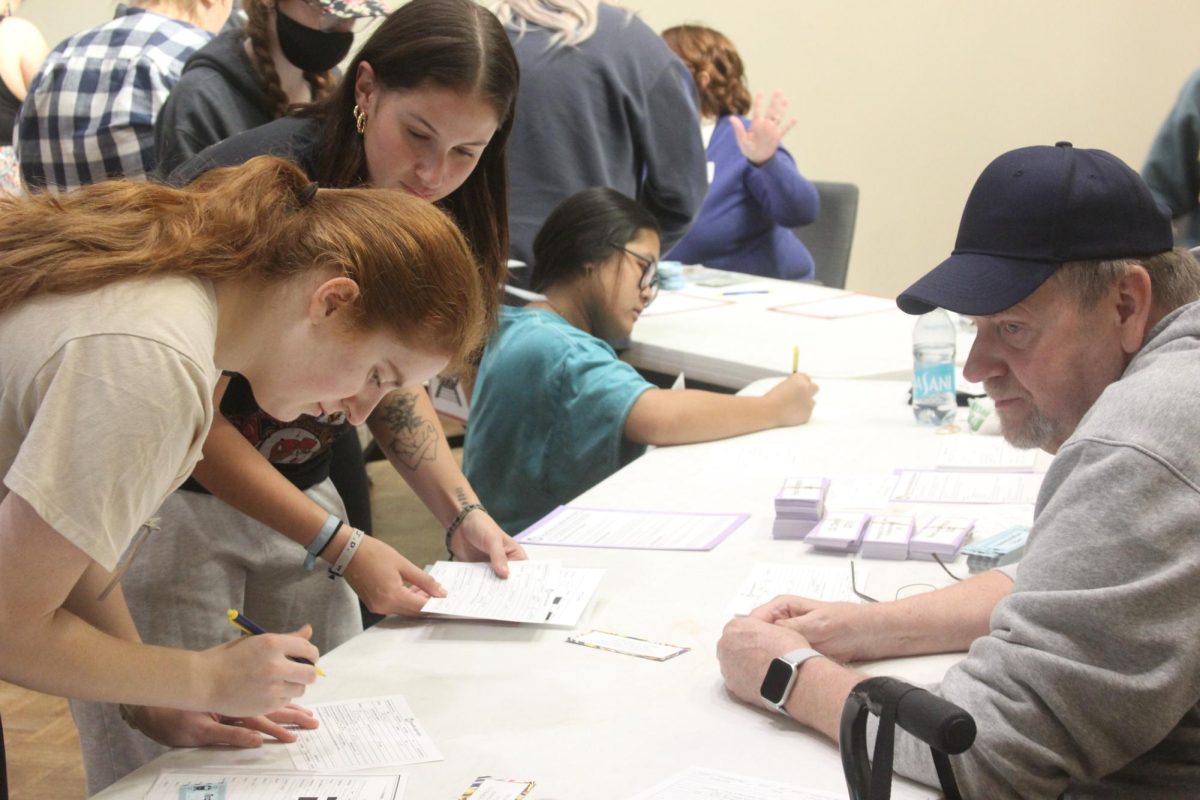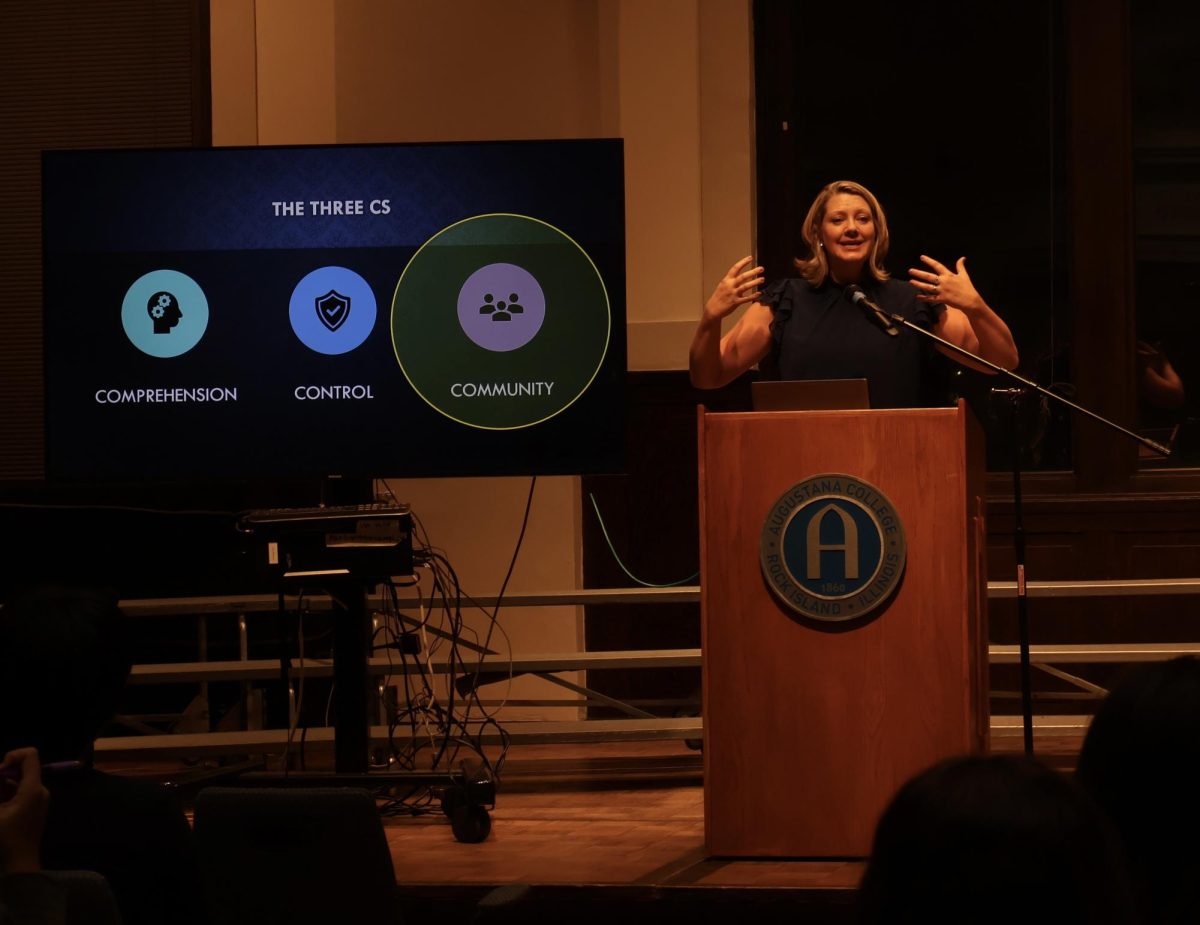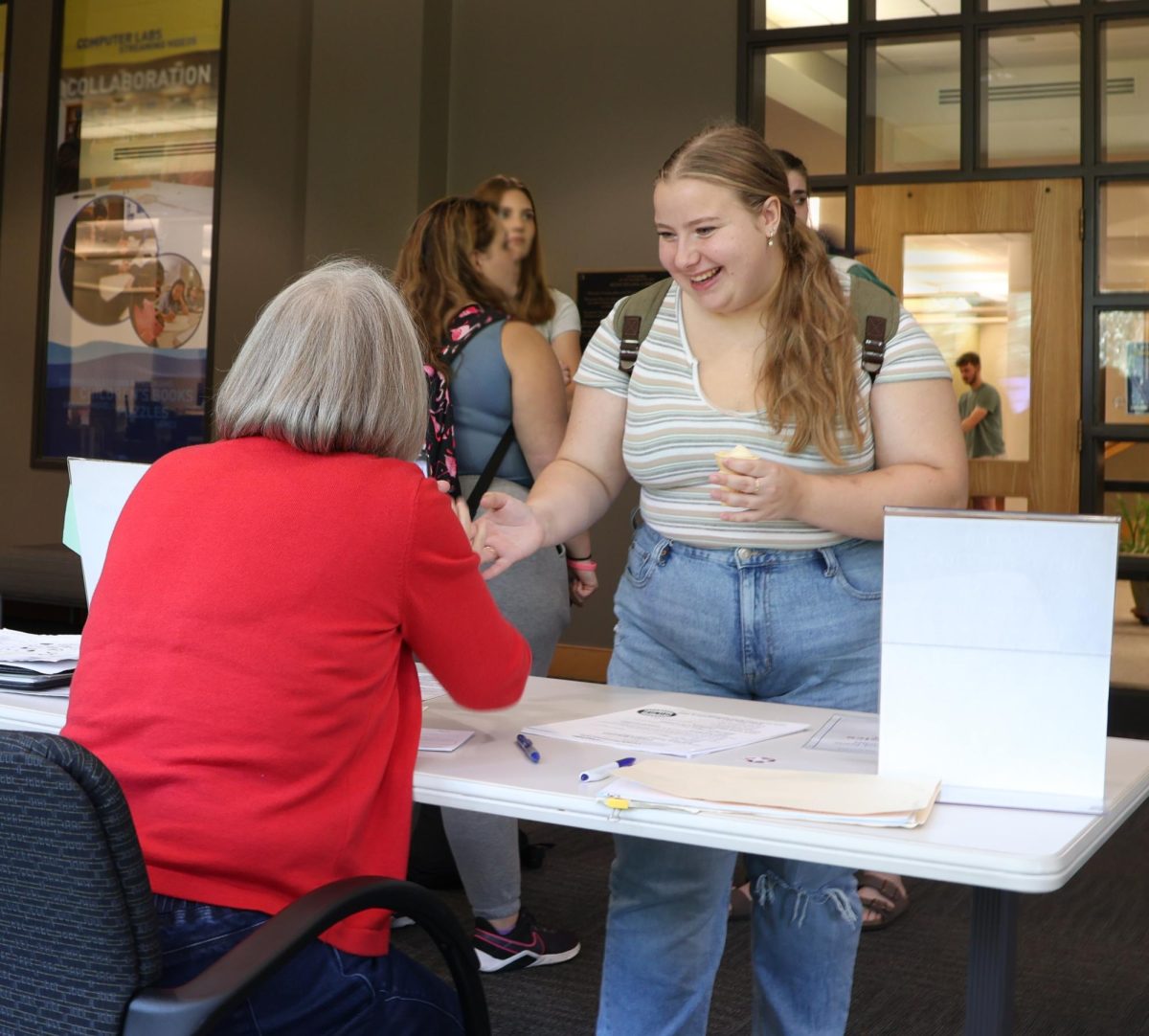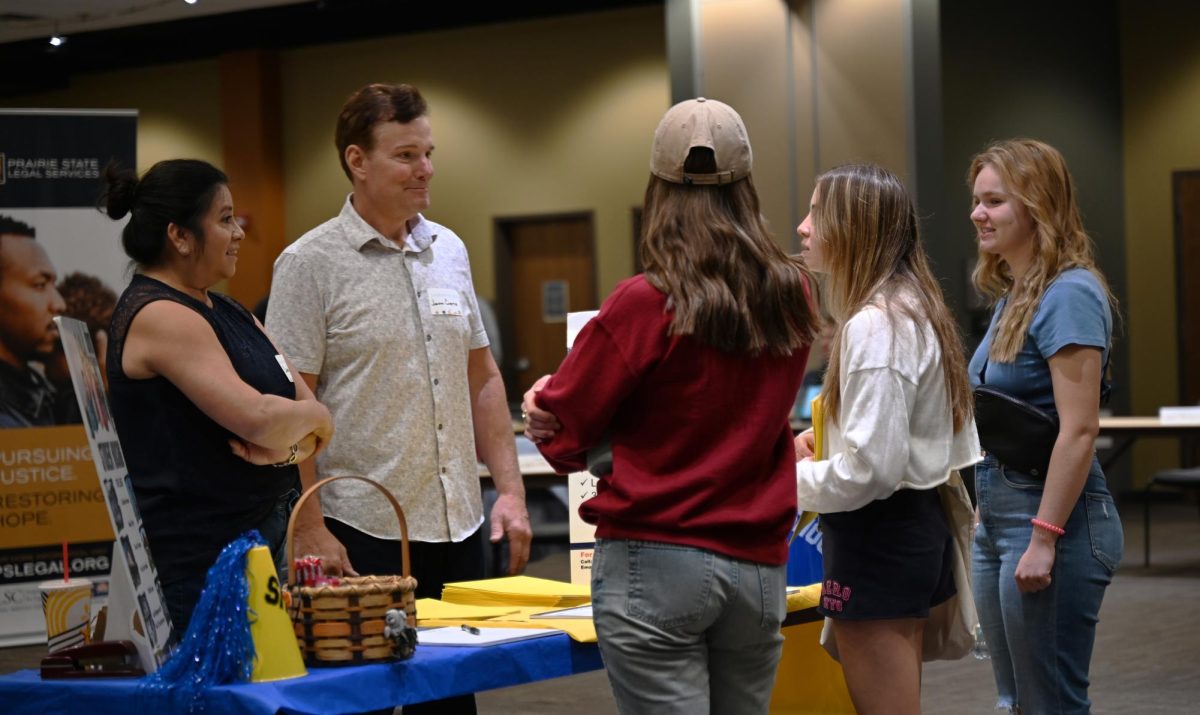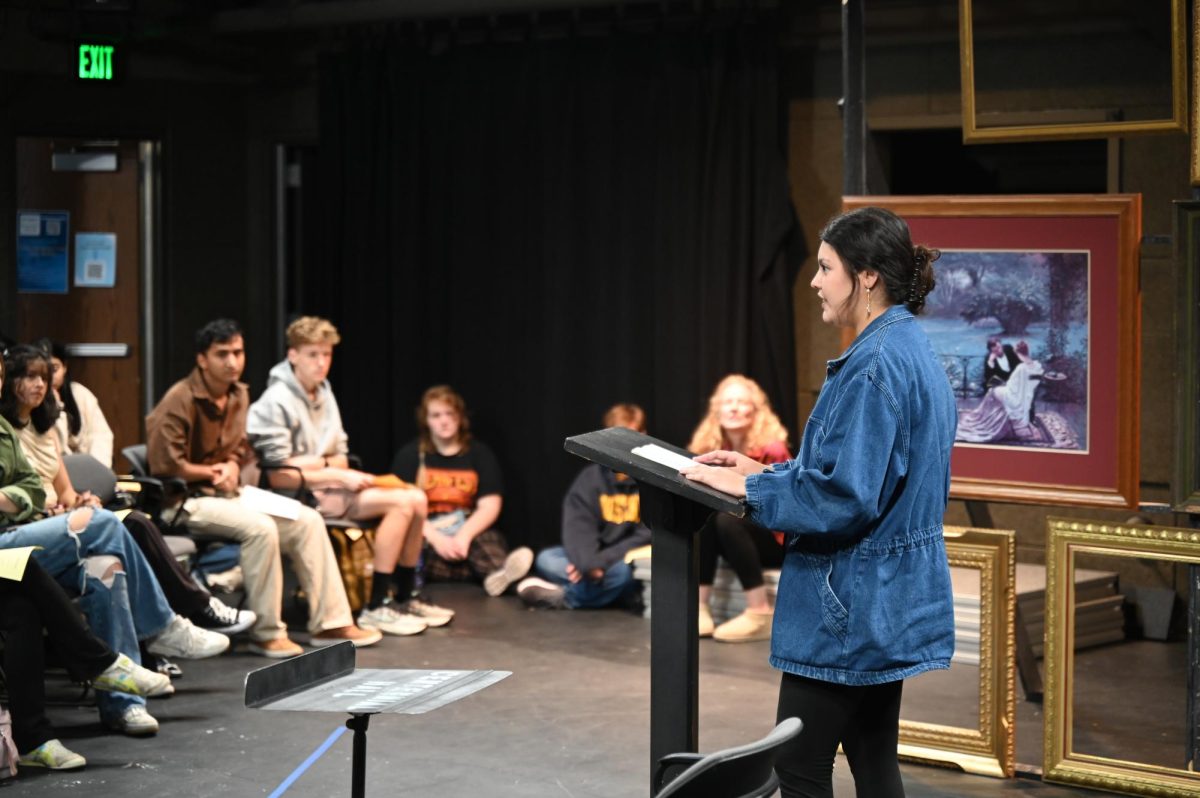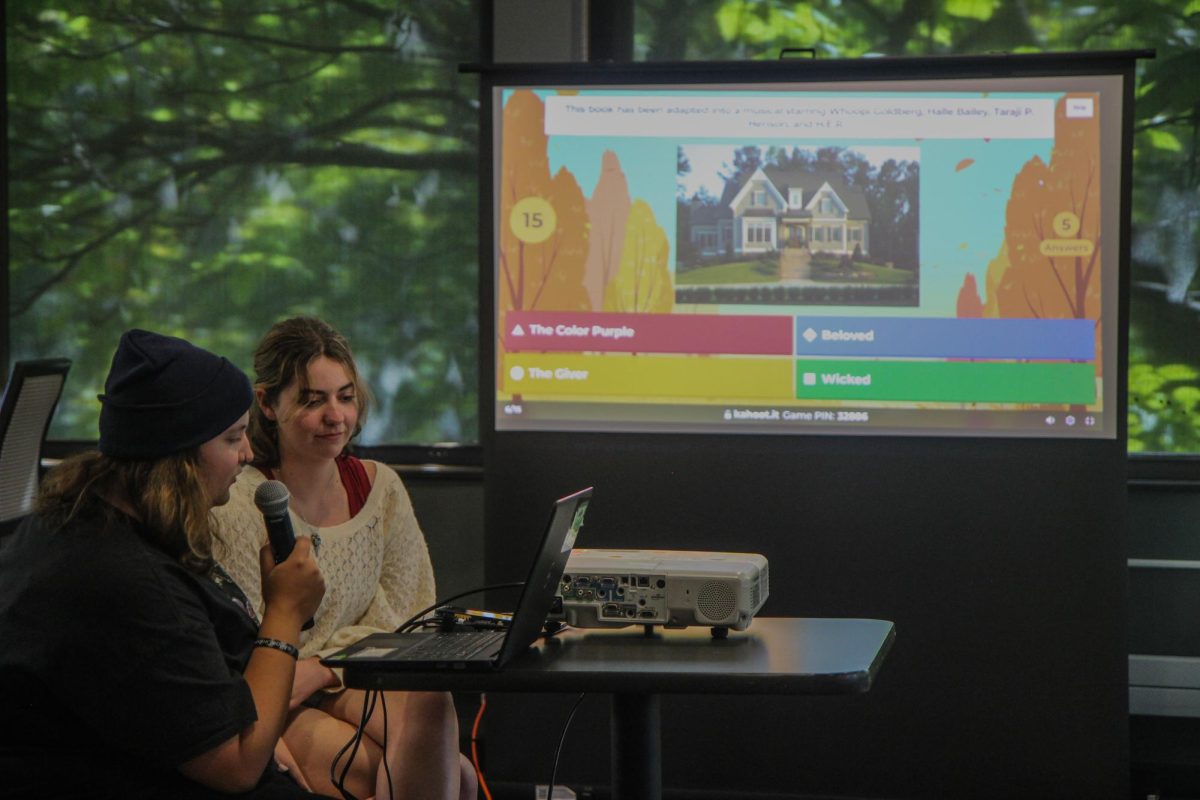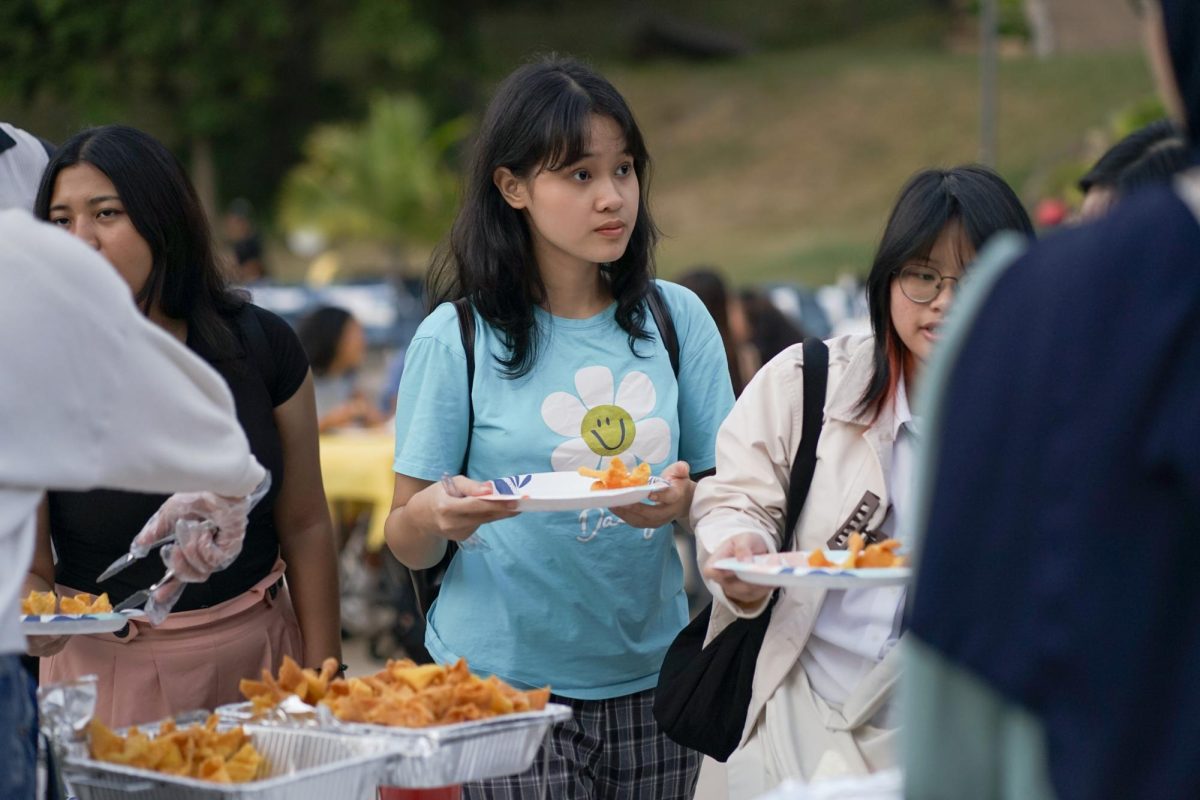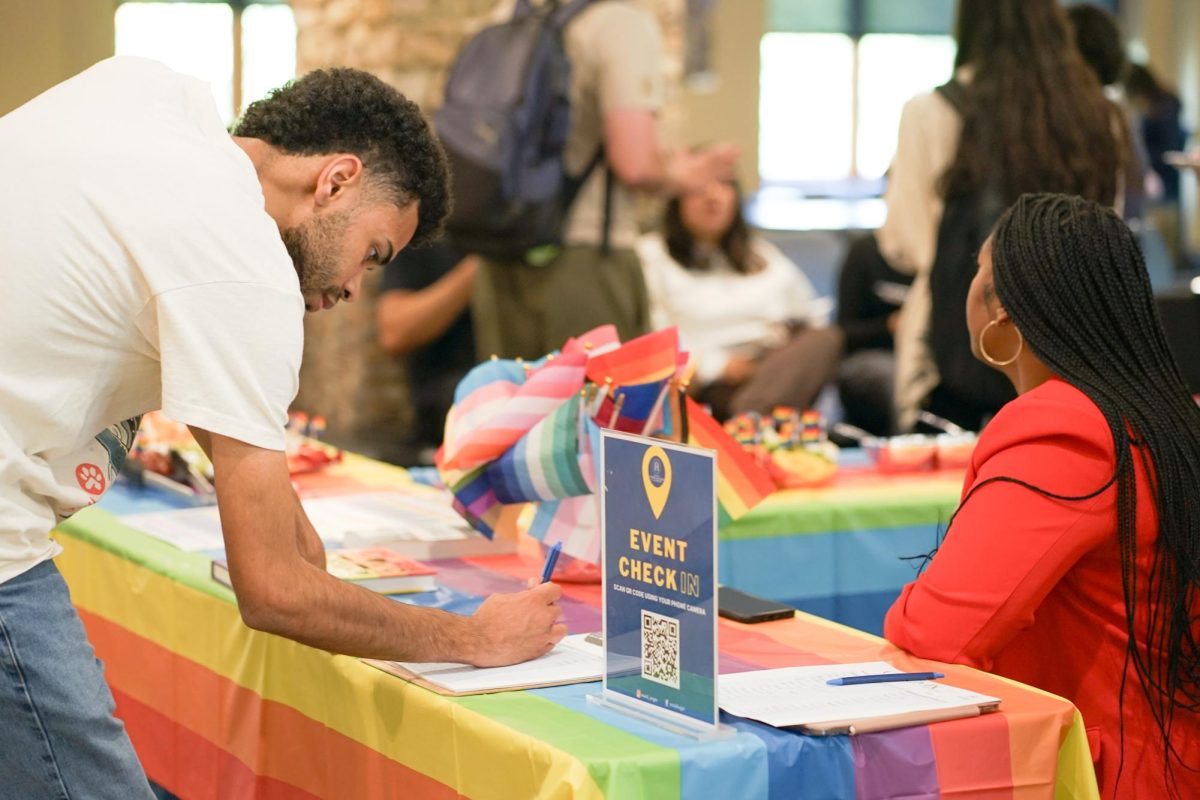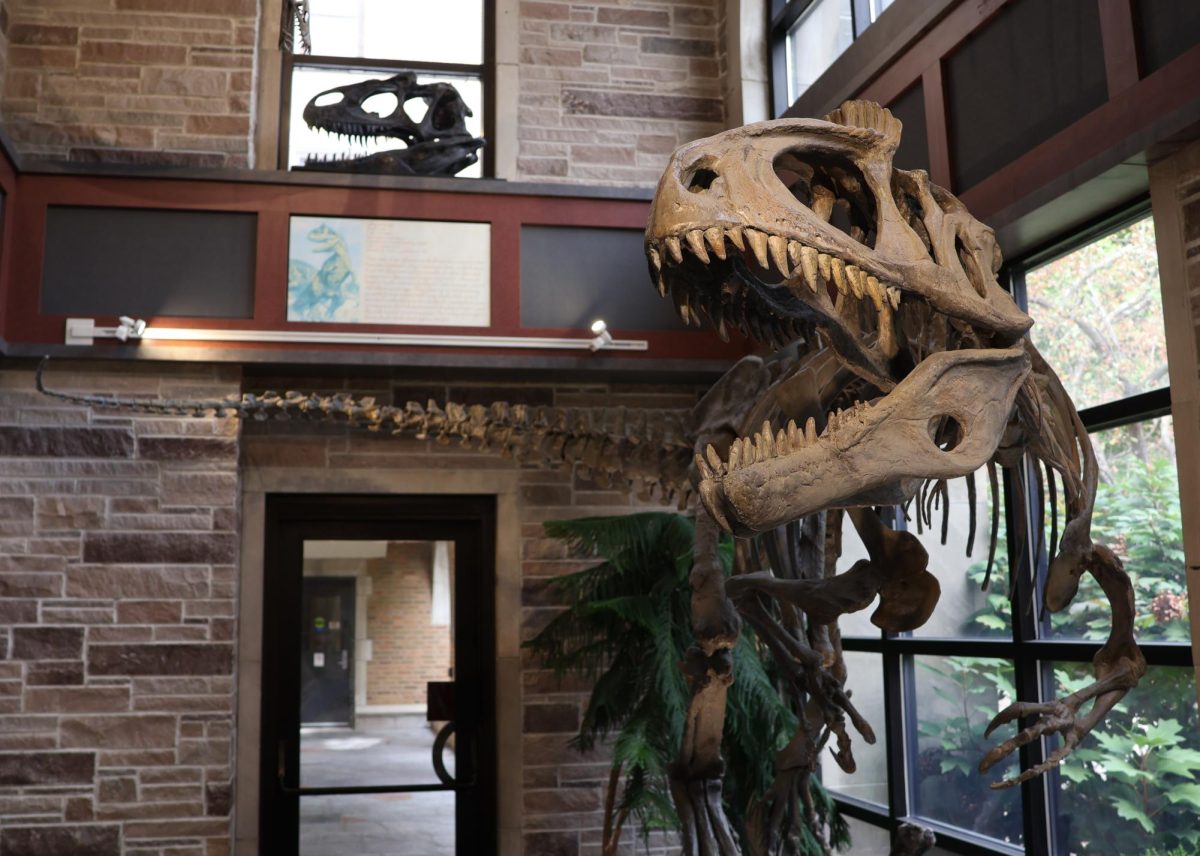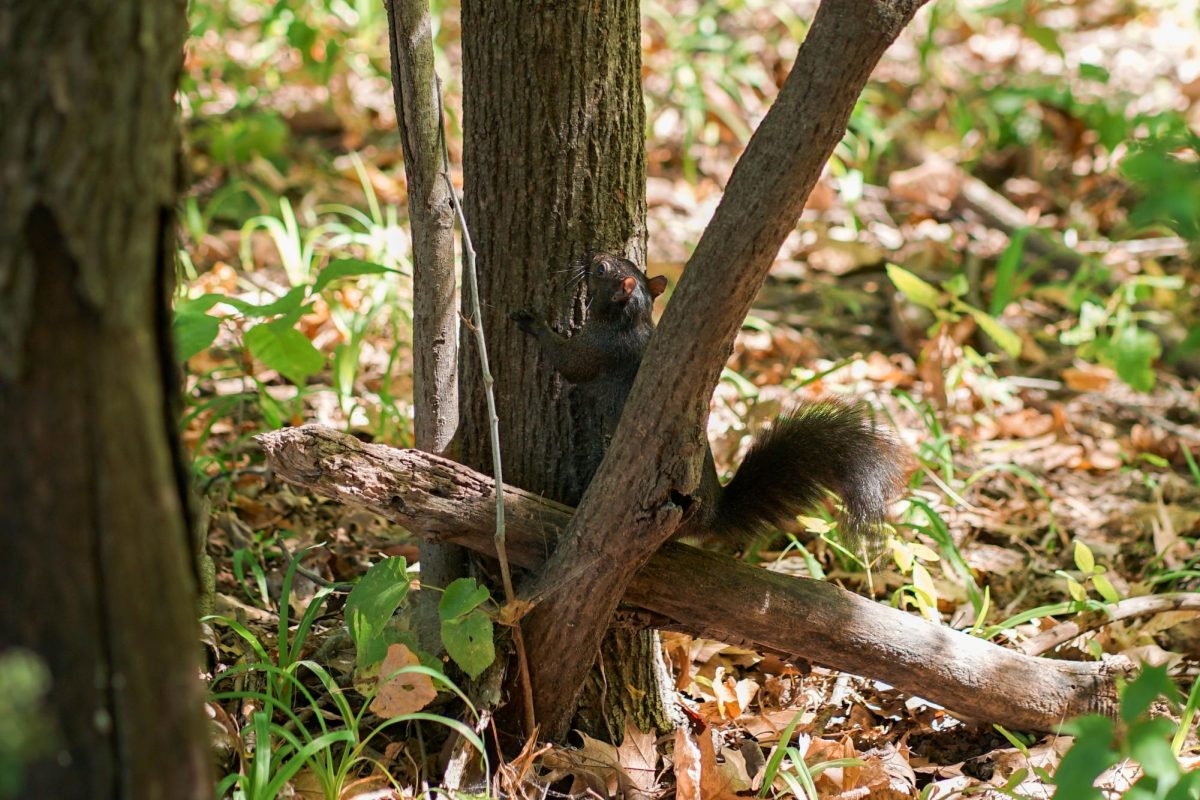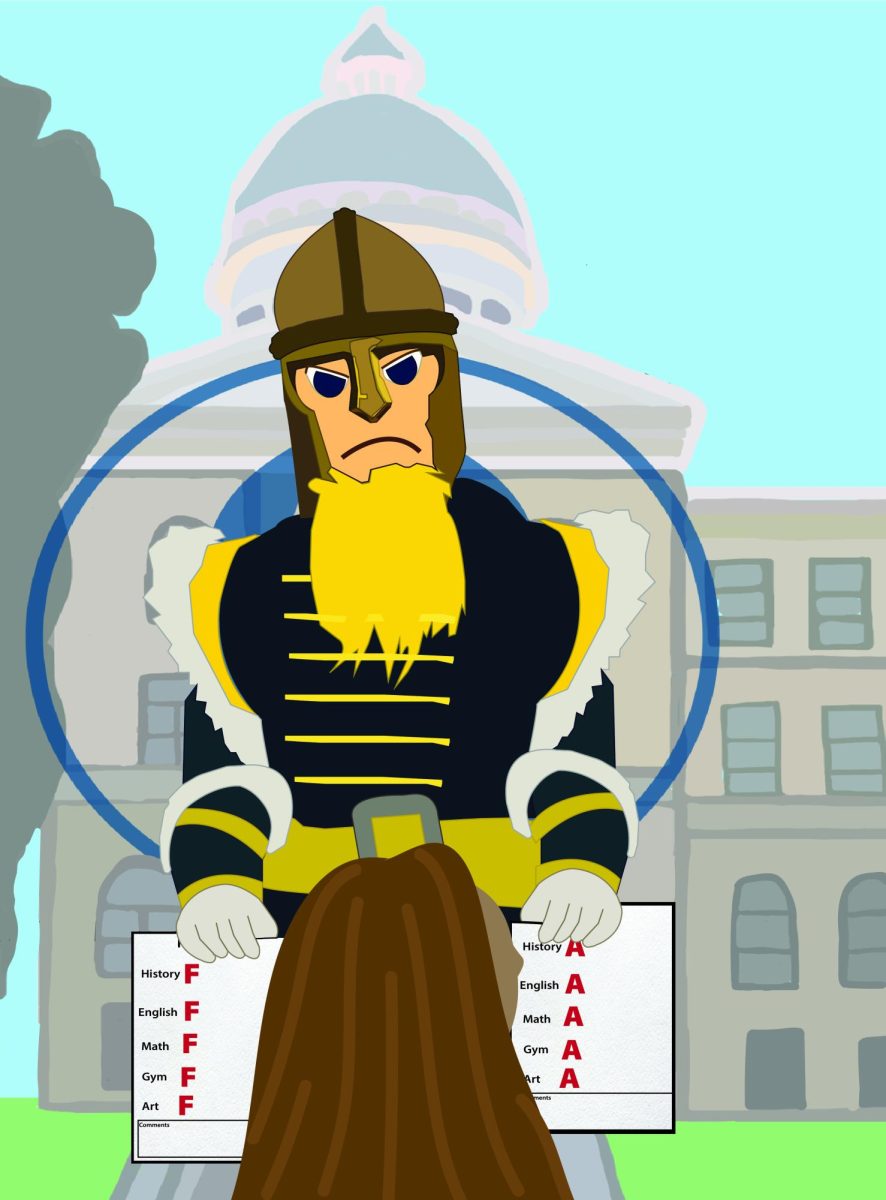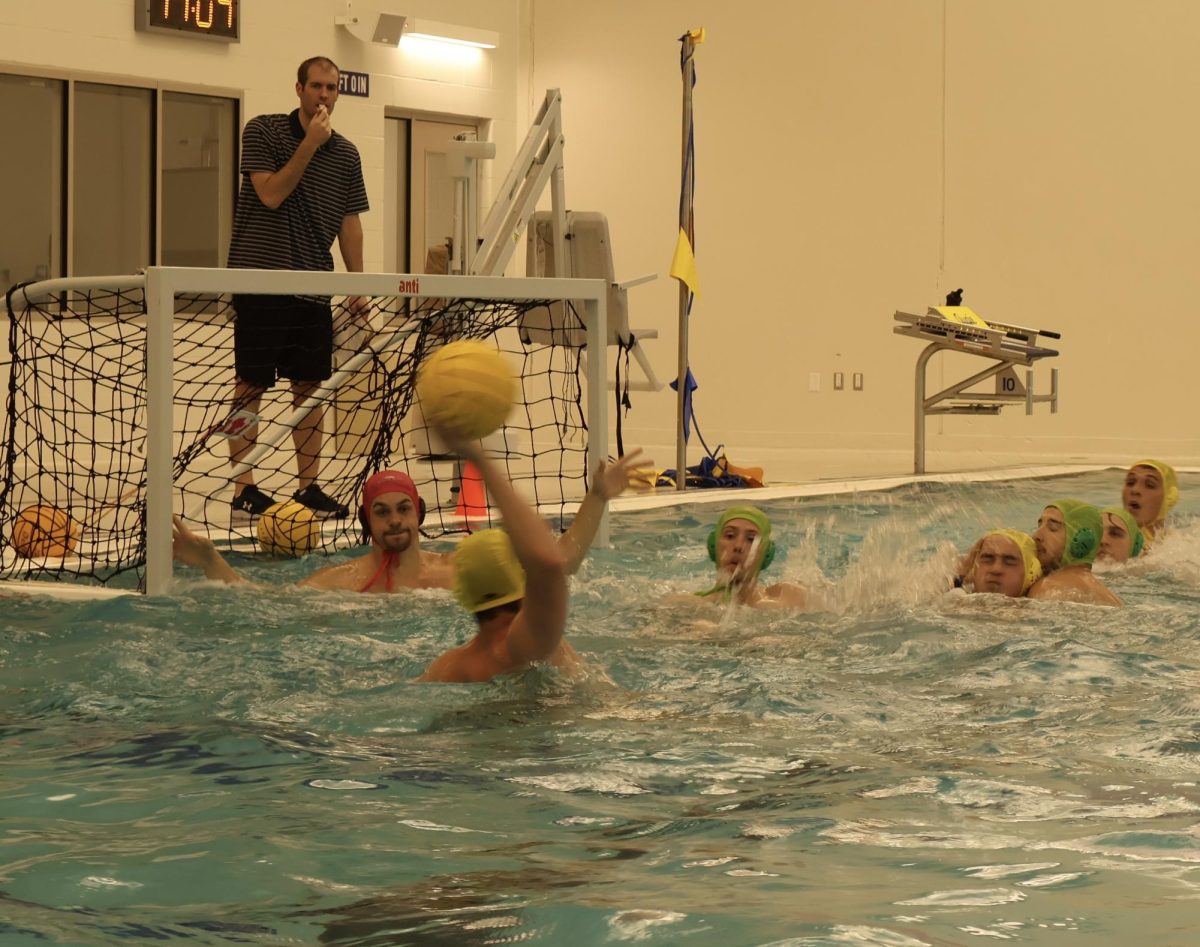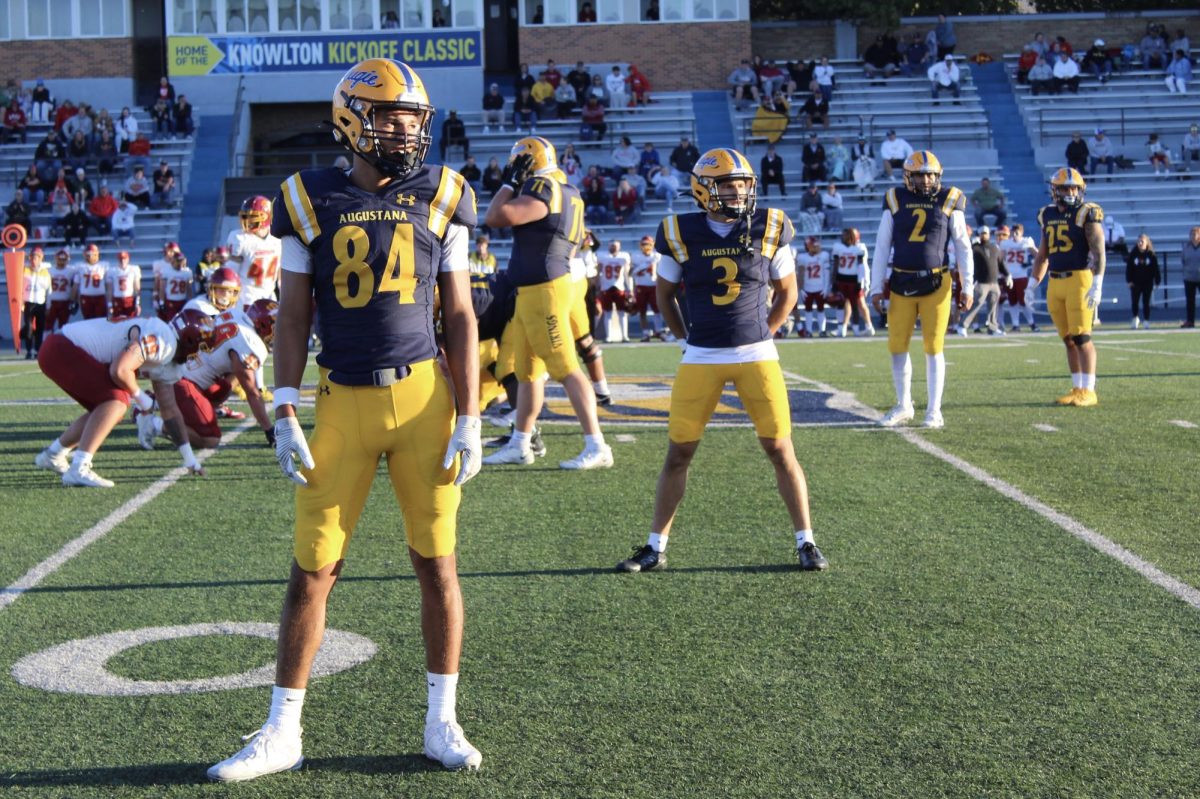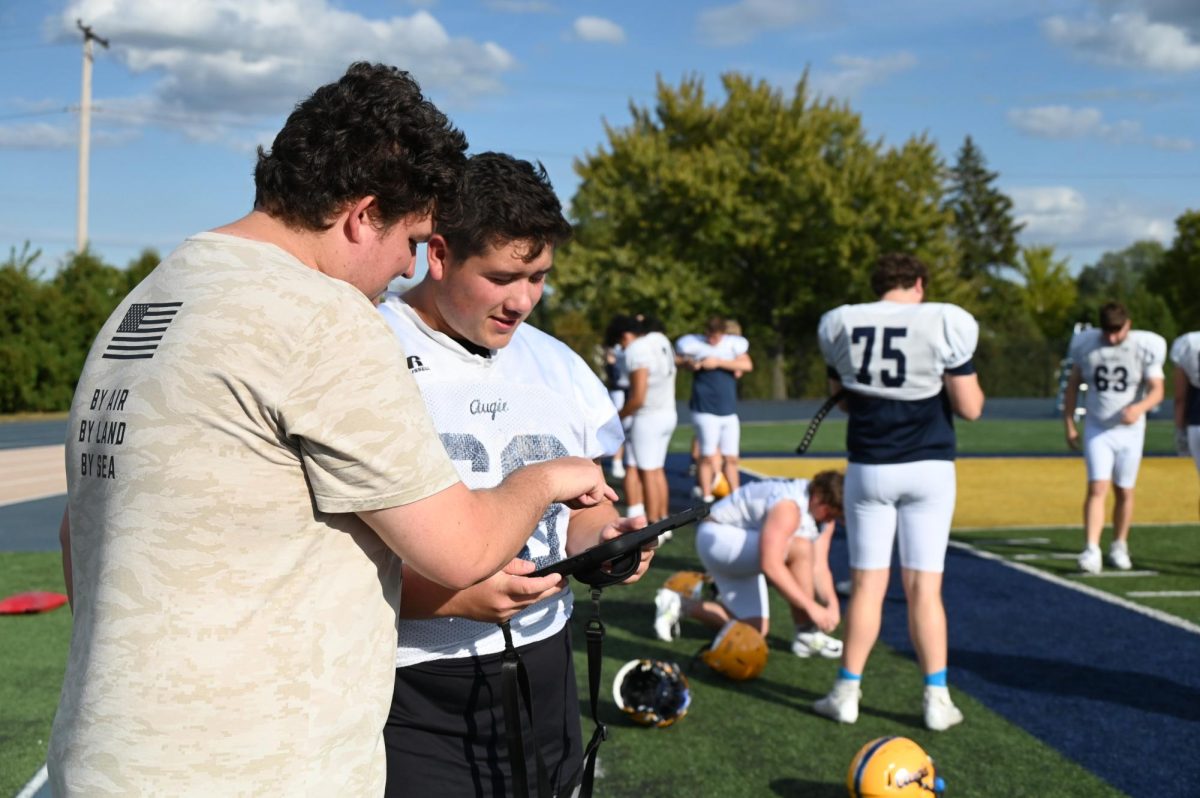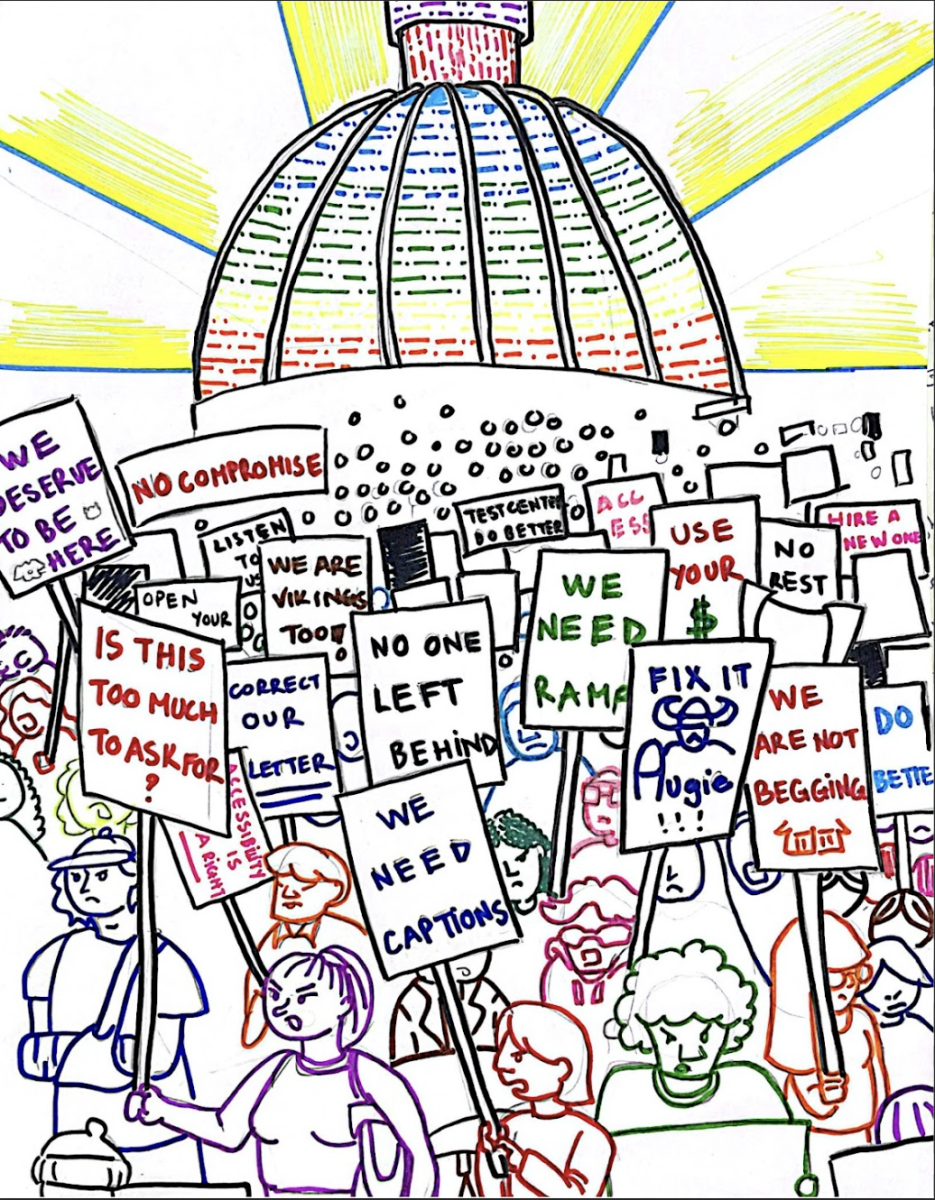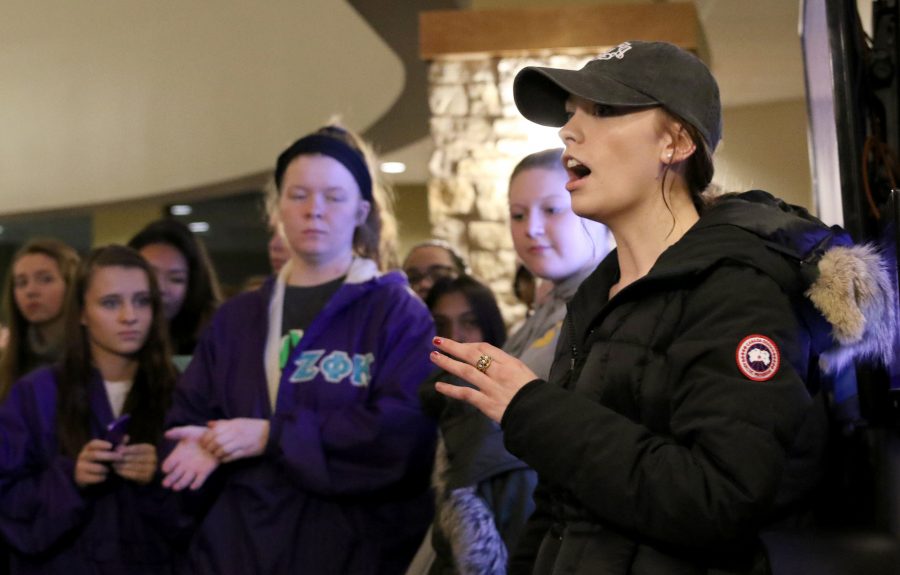Light rain and winter chill washed over the LED candle-holding hands of Augustana students, faculty, staff and administration as they walked from the campus library to the Quad City Botanical Center in a silent march to support sexual assault survivors on Saturday, Feb. 3. Through the 15-minute walk, Rock Island police cars blocked busy intersections, directing traffic around the estimated 200 members of the Augustana community as some unknowing cars honked exasperatedly.
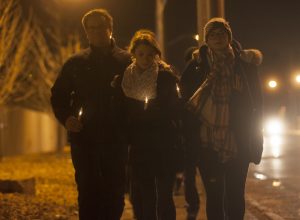
At the venue, participants were encouraged to sign the “Take Care of All of Us” phrig symbolizing commitment to end sexual violence and pin ribbons to their clothes in advocacy, teal for survivors and silver for supporters. While there was no one group that organized the event, +Impact, Her Campus and Safe Path were among some of the speakers, along with five survivors who spoke out. Doors closed as survivors shared their stories and opened as they finished with emotional support advocates in bandanas always available for those who needed them.
Though the night made a difference for many as they listened to the stories of survivors and recognized that everyone had a responsibility in stopping sexual violence, the question that remains for many in the Augustana community is how to move forward, trying to heal in the aftermath of recent sexual assault. What’s next for Augustana, and is it enough?
According to Anna Pfalzgraf, junior, vice-president of +Impact and co-MC of the event, the gathering should have happened much sooner.
“This has been an issue that’s been happening for years, and it’s been a simmering point on campus for a long long time now. Recent events have just pushed it to be that boiling point. And this event, yes, maybe should’ve taken place soon, but it’s happening now,” Pfalzgraf said on the night of the event. “What’s important is to not let this event be the boiling point and then let it die after this. It’s important to link arms with each other after this and continue to do the day-to-day work that needs to be done to build the momentum behind this activism.”
Margaret Gros, senior, survivor and unofficial leader of the movement, wanted those marching to understand that “Take Care of All of Us” was not a protest, but the first step in a campaign of unity as participants gathered in the lower quad to hear her words from the library stairs.
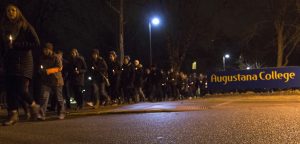
“We stand here today as individuals who want to make a difference, and I think this is definitely the beginning. But I truly believe that taking the first step to doing that – by making change – is by listening and by learning,” Gros said.
For the event organizers, establishing a safe space where empathy and genuine care for everyone was among their priorities. Lit primarily by LED candles, the center’s Olmsted Room was filled with groups of people who represented a movement without Greek letters or group affiliation. Coats were moved off seats to accommodate the overflow of attendants, and the lack of empty chairs between people spoke of an acknowledgment that sexual violence and campus rape culture were issues that affected everyone.
These demonstrations of togetherness were exactly what senior, president of +Impact and co-MC, Natalie Trujillo, hoped would come out of the night.
“There’s a lot of separatism right now between students, faculty and administration. If we can’t all come to a compromise or agreement of some sort, it’s not gonna get any better. And I think it could get worse, because I think that both sides are trying to do things. If we can’t communicate with each other, nothing is gonna happen,” Trujillo said.
Administration: The Next Steps
On Tuesday, Jan. 30, President Steve Bahls issued a statement in regards to sexual assault and Title IX at Augustana where he outlined the progress of the college and emphasized he heard what students had to say.
In his statement, Bahls assured he was creating a task force of students and faculty that would report directly to him, have a review by outside experts of the policies currently in place, a review of incident reports in regards to Title IX and student safety, open communication with student, staff and faculty and an update to the college’s website outlining the efforts being made.
Bahls has scheduled meetings with the Rock Island Police and the Rock Island State’s Attorney “on how to best work together.” Meetings with Congresswoman Cheri Bustos have also taken place about the possibility of getting federal funding for these efforts. There is no commitment to introduce legislation, but Bahls said Bustos would do what she can.
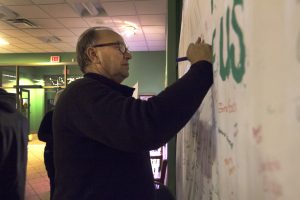
Members involved in the task force and assisting Bahls include Dr. Jennifer Popple, professor of theater and women and gender studies, who was asked to be the chair of the task force. Dr. Jessica Schultz, professor of psychology, is involved in a committee of sexual health that refers to Bahls.
Additional members have yet to be announced. Ashleigh Johnston, director of public relations and social media, notified The Observer of a delay in the update announcement earlier today.
“Unfortunately, that is taking longer than anticipated to complete since I am gathering information from a few different people. I plan to have it out as early as possible on Monday,” Johnston said in an email.
Popple gave the numbers of the people expected to be a part of the task force: an estimated three faculty members, three members of administration and four students. Along with the task force, students can take part in an advisory committee to have an active role on the process.
“We want to make sure that all students feel like they’re heard and that their needs are met…that they feel welcomed and listened to,” Popple said.
In an interview, Bahls gave a different reference to the job position listed in his statement, however the position will continue to be part of the administrative team.
“Schultz and I are working together on developing a job position on sexual assault… [the job] is a full time coordinator on Sexual Health and Violence Prevention. We are hiring an interim position similar to the position of VP of Diversity and Inclusion,” Bahls said.
The report of the task force will be due by May 1, where president Bahls will take the recommendations into consideration.
Rape Culture
Although President Bahls has begun working on plans to address the needs of sexual assault survivors, chalkings and expressions of frustration through graffiti were found on campus the past few weeks.
On Monday, Jan. 29, chalkings within the lower quad’s “Free Speech Space” were discovered voicing the distress that community members felt about Title IX policies. Some of the chalkings said things like “Rape isn’t baseball. It shouldn’t be three strikes and you’re out.”
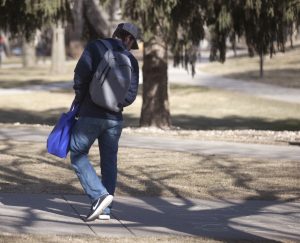
On the morning of Wednesday, Jan. 31, the spray painted message “Poobah = Rape” appeared on the Sorenson Bridge before it was washed away.
And for some students, recent events have sparked awareness of rape culture within seemingly innocent, everyday occurrences.
Sophomore Lily Ford has experienced causal interactions that she said perpetuate rape culture at her on-campus job.
According to her, a senior student posted inappropriate content on her job’s social media sites, content related to drugs, sex and things they did not want to promote. “There were posts on Facebook, through our page. One of them was like, ‘If she says she’ll make out with you, there’s a higher chance of having sex,’” Ford said.
After confronting the student a few times, Ford finally got through to him. According to her, she and her co-worker didn’t feel respected as the ones in charge of her job, which might have been because they were two female students who were younger than the senior. When she went to her job’s advisor, she said he cared about what they said, but warned them against firing the senior.
“[Our advisor has] been supporting us in our concern for how should we deal with this, but then [it felt like] he wasn’t taking what we were saying into consideration. We were trying to have a talk about how we can fix this, and he seemed to let the promotions director be the victim,” Ford said.
Though Ford said posts through social media were relatively small, she acknowledged their place in the larger issue of rape culture.
“I feel like the fact that we let one thing like that go shows how not aware people are of the underlying rape culture that exists everywhere. That was one bad post, but that was one bad post that has a lot of meaning behind it,” Ford said.
Augustana is not the only campus that has struggled with sexual violence. According to Emilee Goad, campus coordinator at SafePath Survivor Resources and Augustana confidential advisor, college sexual assault is part of the larger issue of rape culture.

“Rape culture is the combination of ‘everyday’ things, that seem normal to us, that actually perpetuate sexual violence and oppression. Popular music, marketing and advertising strategies, sexist and homophobic jokes, victim-blaming questions like ‘what were you wearing’ or ‘why didn’t you fight back?’ are all things that feed into and develop rape culture,” Goad said in an email. “It is a part of our everyday lives, even when we don’t realize it. Because some of this stuff is so normalized, it is not viewed in a negative way unless someone deliberately points it out.”
Nationally-leading sociologist and professor at Occidental College, Dr. Lisa Wade, argued that culture is always changing. Though everyone has a role in that change, the hierarchy that exists within colleges decides which voices are heard the most.
“The beautiful thing about culture, and this is what makes it so simultaneously formidable, but also weak, is that culture exists in our mind collectively. If enough people, at the same time, all together, that something cultural is stupid or problematic or needs to go, then they can change it in an instant if they just change their minds all at the same time,” Wade said over the phone. “But there’s another piece that I think is really important too which is you need institutions to even the playing field so that everybody’s minds have equal power.”
According to religion professor and masculinity researcher, Dr. Eric Stewart, now is the time to begin understanding that sexual violence and rape culture are multi-level issues that include the input of students and administration, but also faculty and staff.
“One of the interesting things at the forum is the students clearly blame the administration for the problems on campus. In my view, they expect the administration to do more than they possibly can. I think we should have significant enforcement procedures in place, but we haven’t in history built a society that is always safe. The interesting thing about the forum to me was that the faculty got off basically scott-free,” Stewart said.
The culture Stewart wants to see at Augustana is one that unites everyone, regardless of background or job description, against sexual violence.
“I think if we are going to build a culture where these things are as unlikely to happen as much as they possibly can be, we are going to have to build trust between the administration, the faculty and the students because it is going to take all of us to make that cultural change,” Stewart said. “All of us contribute to rape culture… In a society which is heavily built on misogyny, if we are not activists against rape culture, we’re complacent in it.”
Moving forward
As the Augustana campus continues to address the need for action on sexual assault, many have asked where exactly the next step is from this point on.
Dr. Carrie Hough, professor and feminist anthropologist, has been teaching at Augustana since 2006 and said long-term solutions need to come out of a collaborative approach with faculty and administration.
“I know faculty better than anything else on campus, and I think faculty, myself included, is at the place where we’re willing to ask the hard questions about why we didn’t do more and how we can start doing more,” Hough said. “A lot of us were here before any of the current students were and then are going to be here after. I think it’s important to have some strong leadership from faculty and administration because anything long term depends on that.”
Though she acknowledges that the push for this reform has come from students, she wants faculty and administration to invest in helping address concerns of sexual violence.
“Even if you’re the most passionate, most committed student activist on campus you’re here for four years and then you go, so there has to be buy-in and commitment from those of us who are a part of this community for a much longer period of time. I do feel optimistic about that at this point,” Hough said.
Kirsten Chamberlin, a survivor and senior at Michigan State, was present at the candlelit vigil walk that happened on Saturday, Feb. 3. Chamberlin believes that men should be allowed to express ideas and become a part of the conversation so the movement can gain more supporters.
“I would love for men and women to start talking about it,” Chamberlin said. “I think we’ve kind of suppressed the ability for men to just ask questions and be able to understand where women are coming from… I think there is also a problem where we have this rape culture that we don’t allow men to express what they want to know about this movement and how to move forward with it. If we get males to come and talk about it … we can make this movement so much bigger.”
Sophomore Shelly Summers said a way to start mending the errors in the overall handlings of sexual assault is to be more transparent.
“I feel like we need more transparency like something that was very concerning with me was the numbers,” Summers said. “We don’t have a good clear answer on which cases happen where and which assaults happen on campus and which happen on off campus housing that is associated with Augustana. That is really concerning.”
For students like senior Anna Pfalzgraf, the last month of arguing through Facebook posts and gatherings outside the Gavle rooms and meeting at the Title IX forum have been frustrating and difficult. But the only way to make a lasting impact is to come together in unity.
Pfalzgraf said, “The moderator and the people on the panel were not ready for what happened on that day, but I think it showed us that we have been functioning as separate entities, and if we want to make change on this campus we can no longer function as separate, student body, administration, faculty, we need to function as one entity to create change. It’s not gonna happen in separate categories.”
Marlen Gomez, Brady Johnson, Kevin Donovan, Tony Dzik, and Natalie Spahn contributed to the story.
